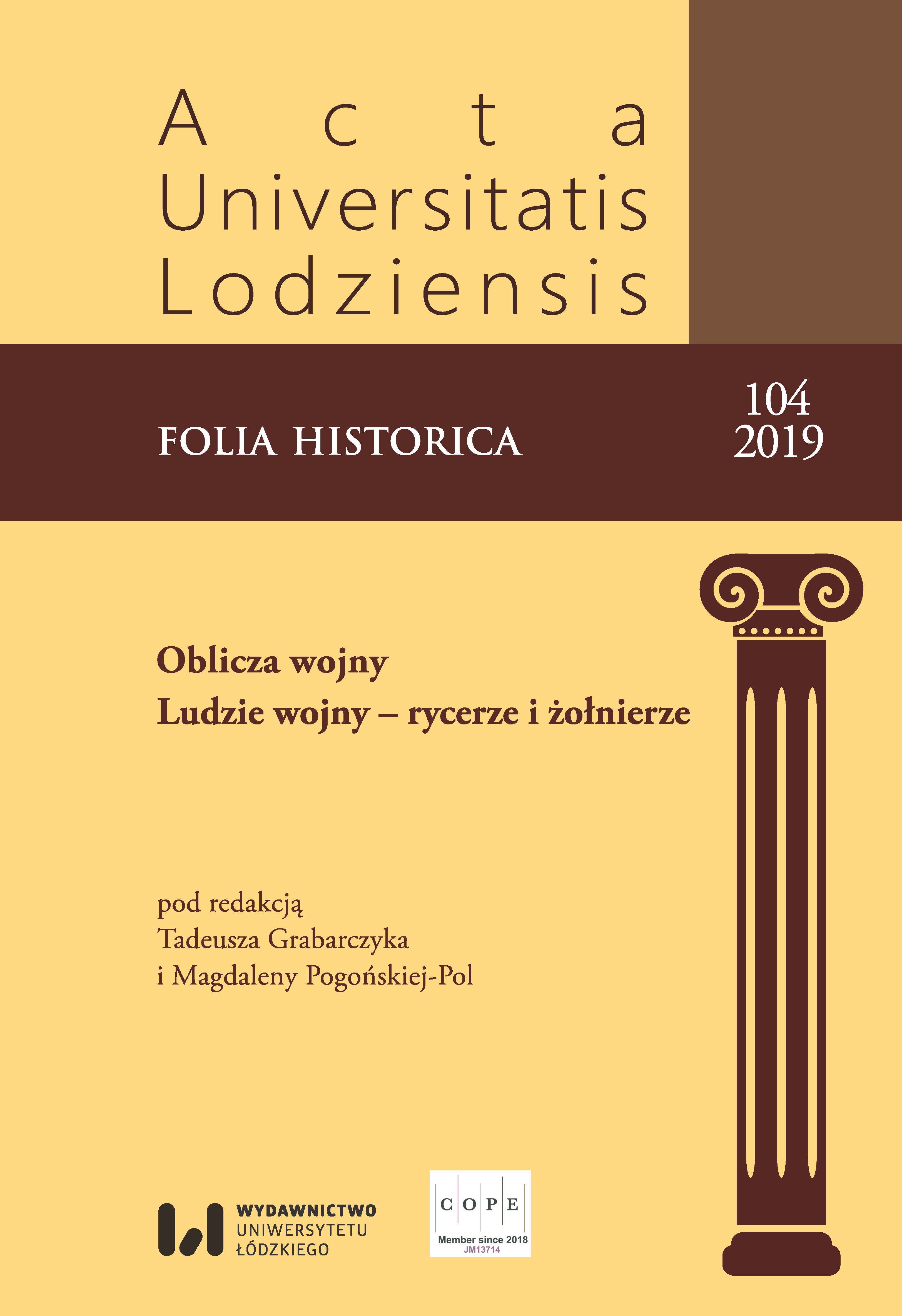Wilhelm Marshal – „najlepszy rycerz jaki kiedykolwiek żył”
DOI:
https://doi.org/10.18778/0208-6050.104.03Słowa kluczowe:
Wilhelm Marshal, średniowiecze, etos rycerski, turnieje rycerskie, literatura średniowiecznaAbstrakt
Artykuł ukazuje idealnego rycerza swoich czasów Wilhelma Marshala (druga połowa XII – początek XIII stulecia), traktującego własne życie jako powołanie i służbę, na pierwszym miejscu stawiającego honor, dzielność i odwagę. Wszystkie czyny rycerza podporządkowane są nadrzędnej zasadzie honorowego postępowania. Największą chwałę przynoszą mu czyny zbrojne, zwycięstwa turniejowe, bohaterstwo na polu walki oraz lojalność. Z biegiem czasu Wilhelm Marshal dał się poznać jako wytrawny dyplomata, administrator, ale również strateg i dowódca.
Pobrania
Bibliografia
L’Histoire de Guillaume de Marechal, Comte de Striguil et de Pembroke, Régent d’Angleterre de 1216 à 1219, publié pour la Société de l’Histoire de France par Paul Meyer, Paris 1891–1901.
Google Scholar
The History of William Marshal, trans. N. Bryant, Woodbridge 2016.
Google Scholar
Asbridge Th., The Greatest Knight: The Remarkable Life of William Marshal, the Power behind Five English Thrones, London 2015.
Google Scholar
Ashe L., Wilhelm Marshal, Lancelot, and Arthur. Chivalry and Kingship, [w:] Anglo-Norman Studies XXX. Proceedings of the Battle Conference 2007, ed. C.P. Lewis, Woodbridge 2008, s. 19–40.
Google Scholar
Ayton A., Knights and Warhorses. Military Service and the English Aristocracy under Edward III, Woodbridge 1994.
Google Scholar
Benson L.D., The Tournament in the Romances of Chrétien de Troyes and L’Histoire de Guillaume le Maréchal, [w:] Chivalric Literature: Essays on Relations between Literature and Life in the Later Middle Ages, eds L.D. Benson, J. Leyerle, Michigan 1980, s. 1–24.
Google Scholar
Bradbury J., The Medieval Siege, Woodbridge 1992.
Google Scholar
Coltman Clephan R., The Tournament. Its Periods and Phases, New York 1919.
Google Scholar
Contamine Ph., Wojna w średniowieczu, Warszawa 1999.
Google Scholar
Crouch D., Strategies of Lordship in Angevin England and the Career of William Marshal, [w:] The Ideals and Practice of Medieval Knighthood II. Papers from the Third Strawberry Hill Conference, eds C. Harper-Bill, R. Harvey, Woodbridge 1988.
Google Scholar
Crouch D., William Marshal, 3rd ed., New York 2016.
Google Scholar
Crouch D., William Marshal and the Mercenariat, [w:] Mercenaries and Paid Men: The Mercenary Identity in the Middle Ages, ed. J. France, Proceedings of a Conference held at University of Wales, Swansea 7th–9th July 2005, Leiden 2008, s. 15–32.
Google Scholar
Crouch D., Writing a Biography in the Thirteenth Century. The Construction and Composition of the History of William Marshal, [w:] Writing Medieval Biography, eds D. Bates, J. Crick, S. Hamilton, Woodbridge 2006, s. 221–235.
Google Scholar
Duby G., William Marshal. The Flower of Chivalry, New York, 1985.
Google Scholar
Gillingham J., Historians Without Hindsight. Coggeshall, Diceto and Howden on the Early Years of John’s Reign, [w:] King John: New Interpretations, ed. S.D. Church, Woodbridge 1999, s. 1–26.
Google Scholar
Gillingham J., War and Chivalry in the History of William the Marshal, [w:] Thirteenth Century England II. Proceedings of the Newcastle upon Tyne Conference 1987, eds P.R. Coss, S.D. Lloyd, Woodbridge 1988, s. 1–13.
Google Scholar
Hyland A., The Medieval Warhorse from Byzantium to the Crusades, London 1994.
Google Scholar
Kaeuper R.W., Wilhelm Marshal, Lancelot, and the Issue of Chivalric Identity, [w:] Kings, Knights and Bankers. The Collected Articles of Richard W. Kaeuper, eds R. Kaeuper, Ch. Guyol, Leiden 2016, s. 221–242.
Google Scholar
Niewiński A., Zadośćuczynienie z tytułu utraty wierzchowca na wojnie jako element podejmowanej przez władcę rekompensaty kosztów działań wojennych w średniowieczu, [w:] Animus Belli 2017. Duch Wojny, t. II (Historia sztuki wojennej. Zwierzęta na polu walki), red. J. Lasota, M. Palczewska, Warszawa 2017, s. 37–58.
Google Scholar
Oksanen E., Flanders and the Anglo-Norman World, 1066–1216, Cambridge 2012.
Google Scholar
Painter S., William Marshal, Knight-Errant, Baron, and Regent of England, Toronto 1982.
Google Scholar
Piwowarczyk J., Wilhelm Marszałek – Słońce Anglii, [w:] Słynni rycerze Europy. Rycerze w służbie dam i dworu, Warszawa 2009, s. 249–301.
Google Scholar
Powicke F.M., The Loss of Normandy (1189–1204). Studies in the History of the Angevin Empire, 2nd ed., Manchester 1960.
Google Scholar
See Mullally E., Did John of Earley write the Histoire de Guillaume le Maréchal?, [w:] The Court Reconvenes. Courtly Literature Across the Disciplines, eds B. Altmann, C. Carroll, Cambridge 2003, s. 256–264.
Google Scholar
Stanton Ch.D., Medieval Maritime Warfare, Barnsley 2015.
Google Scholar
Strickland M., Against the Lord’s Anointed. Aspects of Warfare and Baronial Rebellion in England and Normandy 1075–1265, [w:] Law and Government in Medieval England and Normandy. Essays in Honour of Sir James Holt, eds G. Garnett, J. Hudson, Cambridge 1994, s. 56–79.
Google Scholar
Strickland M., Anglo-Norman Warfare. Studies in Late Anglo-Saxon and Anglo-Norman Military Organization and Warfare, Woodbridge 1992.
Google Scholar
Strickland M., Henry the Young King 1155–1183, Yale 2016.
Google Scholar
Strickland M., On the Instruction of a Prince. The Upbringing of Henry, the Young King, [w:] Henry II. New Interpretations, eds Ch. Harper-Bill, N. Vincent, Woodbridge 2007, s. 184–214.
Google Scholar
Tout Th.F., The Fair of Lincoln and the Histoire de Guillaume de Marechal, [w:] The Collected Papers of Thomas Frederick Tout, ed. J. Tait, vol. II, Manchester 1932–1934, s. 191–220.
Google Scholar
Vale M., War and Chivalry. Warfare and Aristocratic Culture in England, France and Burgundy at the End of the Middle Ages, London 1981.
Google Scholar
White L., Medieval Technology and Social Change, New York 1966.
Google Scholar
Pobrania
Opublikowane
Jak cytować
Numer
Dział
Licencja

Utwór dostępny jest na licencji Creative Commons Uznanie autorstwa – Użycie niekomercyjne – Bez utworów zależnych 4.0 Międzynarodowe.











